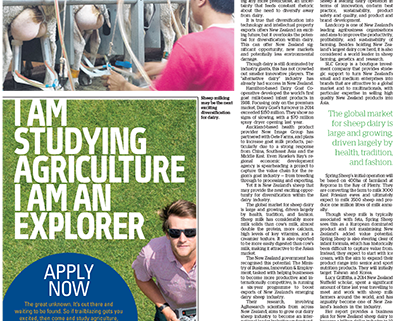http://nzh.tw/11481422
Tim McCready
Sheep milk products may become a Holy Grail as the agricultural industry continues to diversify, writes Tim McCready.
Dairy diversification is a very New Zealand preoccupation, and with good reason. Dairy prices are not becoming any more predictable, an uncertainty that feeds constant rhetoric about the need to diversify away from dairy.
It is true that diversification into technology and intellectual property exports offers New Zealand an exciting future, but it overlooks the potential for diversification within dairy. This can offer New Zealand significant opportunity, new markets and potentially less environmental damage.
Though dairy is still dominated by industry giants, this has not crowded out smaller innovative players. The “alternative dairy” industry has already had success in New Zealand.
Hamilton-based Dairy Goat Cooperative developed the world’s first goat milk-based infant products in 1988. Focusing only on the premium market, Dairy Goat’s turnover in 2014 exceeded $150 million. They show no signs of slowing, with a $70 million spray dryer opening last year.
Auckland-based health product provider New Image Group has partnered with Oete Farms, and plans to increase goat milk products, particularly due to a strong response from China, Southeast Asia and the Middle East. Even Hawke’s Bay’s regional economic development agency is spearheading a project to capture the value chain for the region’s goat industry — from breeding through to processing and exporting.
Yet it is New Zealand’s sheep that may provide the next exciting opportunity for diversification within the dairy industry.
The global market for sheep dairy is large and growing, driven largely by health, tradition, and fashion. Sheep milk has considerably more milk solids than cow’s milk, almost double the protein, more calcium, high levels of key vitamins, and a creamier texture. It is also reported to be more easily digested than cow’s milk, making it attractive to the Asian market.
The New Zealand government has recognised this potential. The Ministry of Business, Innovation & Employment, tasked with helping businesses to become more productive and internationally competitive, is running a six-year programme to boost exports of New Zealand’s emerging dairy sheep industry.
Their research, involving AgResearch scientists from across New Zealand, aims to grow our dairy sheep industry to become an international leader by better understanding sheep milk composition and function, boosting production and value, and ensuring the environmental footprint of the industry is sustainable.
New Zealand’s dairy sheep industry is already reasonably established, with five commercial operations, but there are signs it can expand and innovate further still.
AntaraAg, New Zealand’s largest producer, has around 20,000 stock units and produces cheese and milk powder, mostly for export. Earlier this year AntaraAg’s predecessor, Blue River Dairy, sold its processing plant and brand to Chinese company Blueriver Nutrition HK — a necessary step for expansion into Asia after a year of unsuccessful negotiation to have Blue River Dairy’s infant formula certified in China.
On top of this, New Zealand’s sixth commercial sheep dairy operation was announced last month. Spring Sheep Dairy is a 50/50 partnership of SLC Group and State-owned enterprise Landcorp, and has ambitions to lead this field.
The partners aim to make Spring Sheep a leading dairy operation in terms of innovation, on-farm best practice, sustainability, product safety and quality, and product and brand development.
Landcorp is one of New Zealand’s leading agribusiness organisations and aims to improve the productivity, profitability, and sustainability of farming. Besides holding New Zealand’s largest dairy cow herd, it is also considered a world leader in sheep farming, genetics and research.
SLC Group is a boutique investment company that provides strategic support to turn New Zealand’s small and medium enterprises into brands that are attractive to a global market and to multinationals, with particular expertise in selling high quality New Zealand products into Asia.
Spring Sheep’s initial operation will be based on 400ha of farmland at Reporoa in the Bay of Plenty. They are converting the farm to milk 3000 East Friesian ewes and ultimately expect to milk 3500 sheep and produce one million litres of milk annually.
Though sheep milk is typically associated with feta, Spring Sheep sees this as a European dominated product and not maximising New Zealand’s added value potential. Spring Sheep is also steering clear of infant formula, which has historically been difficult to capture value from. Instead, they expect to start with ice cream, with the aim to expand their product range into senior and sport nutrition products. They will initially target Taiwan and Korea.
Lucy Griffiths, a 2014 New Zealand Nuffield scholar, spent a significant amount of time last year travelling to meet and work with sheep milk farmers around the world, and has arguably become one of New Zealand’s leaders in the industry.
Her report provides a business plan for New Zealand sheep dairy to become a billion dollar industry in 10 years’ time.
Griffiths can see the sheep industry offering New Zealand massive opportunity. “When I met with leading industry experts in the Middle East, Afimilk, they pointed out that the return on investment for sheep dairy is five years on average, versus 20 years for dairy cows. Sheep dairy could also provide a more viable return for the land and reduce the environmental impact at the same time.”
But Griffiths noted: “If New Zealand wants to position itself as a leader, we must be market-led and offer a point of difference from other large global producers.”




Leave a Reply
Want to join the discussion?Feel free to contribute!